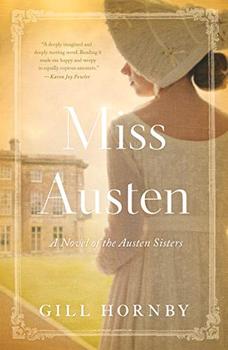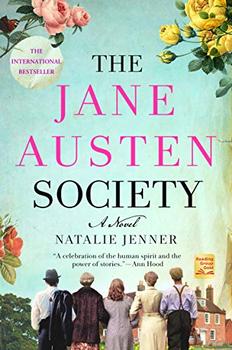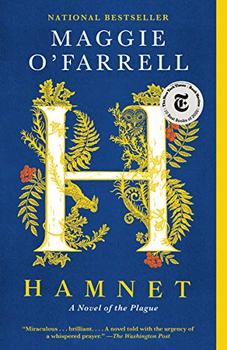Summary | Excerpt | Reading Guide | Discuss | Reviews | Beyond the book | Read-Alikes | Genres & Themes | Author Bio

Gill Hornby's Miss Austen did very well with our First Impressions readers, garnering an average rating of 4.4 out of 5 stars. Hornby is the author of the previous novels The Hive and All Together Now, as well as a biography of Jane Austen for young readers, The Story of Jane Austen.
What the book is about:
Miss Austen by Gill Hornby focuses on Cassandra (see Beyond the Book), Jane's older sister, constant companion and literary executor of her estate. Always concerned about the legacy that Jane will leave, when Cassandra learns that the parsonage where the Fowles—extended family and great friends of the Austens—lived is being claimed by the replacement clergyman, she invites herself to stay. She is determined to find and censor any letters that might cast a shadow on Jane's life. And as is often the case when you dig in the past, she learns some things she might prefer not to know (Dorothy M). One would assume that a book titled Miss Austen would be about Jane Austen, but Cassandra Austen, Jane's sister, is the protagonist of this well written historical novel. Jane is deceased, and Cassandra is going through old letters of hers, deciding which are important to tell the story of Jane's life (Julie Z).
Readers enjoyed delving into the life of Cassandra Austen and her relationship with her famous sister.
What a wonderful step into the world of Cassandra Austen—and sister Jane. I was thoroughly delighted with Hornby's rendering of Jane and Cassie's lives. It's fun to see Jane as a little "snarky" at times and Cassie's inner thoughts contrasting with her outward behavior (Gwen C). Very few relationships come close to the intensity of sisters. If close, there is nothing that can come between them. Such was the case with Cassandra and Jane Austen. Though more of a supporting character in a family with some very colorful personalities, Cassandra Austen proved her love and loyalty to Jane throughout their lives and after. This book focuses on the after, and the preservation of Jane's good name, though on its own it is a delightful window into Cassandra's reimagined life (Anne M).
While some reviewers found parts of the story underdeveloped, including the character of Jane,
The portrayal of Jane Austen as fragile, emotionally unstable and depressed seemed contrived and did not ring true to me (Terri O). Cassandra is a very interesting and sympathetic character but Jane remains elusive. There is a crowded cast of characters (many clearly based on Austen's) that never really catch and keep the reader's attention (Margot P).
...many appreciated the insights they gained into the experiences of women at the time...
An unflinching look at the constraints around women's lives in the 1700s and 1800s, the novel shows how bright, creative women like Jane Austen and her sister Cassandra navigated within those gender limitations and ultimately created space for themselves to live lives of their choosing (Katie V). As Jane Austen did, Hornby shows us the options open to women during the period, always limited, and the dismal opportunities for single women or women whose husbands were no longer around (Dorothy M).
...and the influences of Jane's work on the story.
In this delightful novel about Jane Austen's sister Cassandra the author deftly weaves in familiar Austen plot elements: sisters and their immediate and extended relatives; seaside visits; a public dance and a picnic; visits with friends; domestic issues and long walks; off-stage marriage proposals and their consequences; mistakes about love, some fixable and some not; and the necessity of finding one's place in the world, particularly for unmarried women (Deborah W). Those familiar with Jane's novels will enjoy the prose style, reminiscent of Austen's own, which transports the reader into the life of the early 19th-century spinsters. The story has parallels to Austen's novels, perhaps especially Persuasion. Highly recommended for Austen lovers (Rebecca H)!
![]() This review was originally published in The BookBrowse Review in May 2020, and has been updated for the
March 2021 edition.
Click here to go to this issue.
This review was originally published in The BookBrowse Review in May 2020, and has been updated for the
March 2021 edition.
Click here to go to this issue.

If you liked Miss Austen, try these:

by Natalie Jenner
Published 2021
Just after the Second World War, in the small English village of Chawton, an unusual but like-minded group of people band together to attempt something remarkable.

by Maggie O'Farrell
Published 2021
"Of all the stories that argue and speculate about Shakespeare's life … here is a novel … so gorgeously written that it transports you." —The Boston Globe
Your guide toexceptional books
BookBrowse seeks out and recommends the best in contemporary fiction and nonfiction—books that not only engage and entertain but also deepen our understanding of ourselves and the world around us.